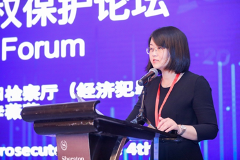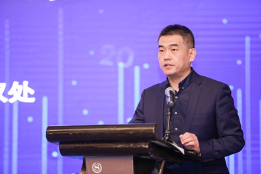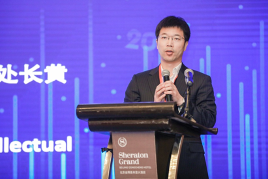QBPC First IP Forum Held Beijing
by Andrei Yang
On November 3, Quality Brands Protection Committee (“QBPC”) held its first IP protection forum in Beijing. The forum, part of QBPC’s annual meeting, was presided over by Chair Michael Ding. Deputy Director General of the Office of the National Leading Group on the Fight against IPR Infringement and Counterfeiting (“NLGO”) and Deputy Director-General of Bureau of Law Enforcement and Inspection of State Administration for Market Regulation Lu Zhengmin, Presiding Judge of the 3rd Civil Tribunal of the Supreme People’s Court of China Qin Yuanming, Presiding Judge of the Intellectual Property Court of the Supreme People’s Court of China He Peng, Senior Prosecutor of the 4th Department of Supreme People’s Procuratorate (Procuratorial Department of Economic Crimes) Li Weiwei, Director of Intellectual Property Division within the Department of Food and Drug Crime Investigation of the Ministry of Public Security Wang Fei and Director of Intellectual Property Division within the Department of General Operation of the General Administration of Customs of China Huang Jianhua delivered the keynote addresses.
An ideal IP protection system should be built by the people and for the people. The fundamental goal of IP protection is to encourage companies to grow their brands and invest in innovations. How to best achieve such goal is what corporations, judicial and enforcement agencies should work out. In August, NLGO and eight ministerial departments jointly published Opinions on Proper and Timely Disposal of Counterfeits and Infringing Products, addressing the most critical issues to right holders. The “Kunlun 2020” special operation, initiated by the Ministry of Public Security and fully supported by right holders, solved a number of major cases. In September, the Department of Food and Drug Crime Investigation of the Ministry of Public Security visited QBPC to discuss new measures for IP protection. The visit was visited QBPC to discuss the new measures in protecting intellectual property. It was the first stop for the Department’s study tour on how to support the business.



Harmonizing judicial and enforcement standards will become a major focus. Since the start of consolidating civil, administrative and criminal IP trials in 2016, the Supreme People’s Court has trained many judges that are familiar with all three kinds of trials, which helped avoid conflicting verdicts in civil and criminal proceedings, reduce uncertainties in judicial process and improve efficiency. The creation of IP tribunal within the Court has united the jurisdictions for deciding appeals of patent invalidation and infringement, finally connecting the procedural process and harmonizing the judicial standards for right and infringement determinations. This will help shorten the long trial period for patent litigations in a fundamental way. Next, the Court will further promote uniting the three types of IP trials in one courtroom across the country. Meanwhile the judicial organs will keep exploring procedural breakthroughs and innovation.
Criminal protection for IPR has improved. In August, the Supreme People’s Court and the Supreme People’s Procuratorate released judicial interpretations regarding the application of law in criminal IP cases. In September, the Supreme People’s Procuratorate and the Ministry of Public Security announced the decision to change the standard for filing an official investigation into criminal trade secret misappropriation cases, lowering the required amount of damages caused to right holders or the illegal gain from 500,000Yuan to 300,000Yuan. Through judicial interpretations and documents, the criminal IP trial, in interpreting key concepts, is applying standards that are more and more in line with those applied in the civil and administrative adjudication. This year the Supreme People’s Procuratorate initiated a pilot program requiring that right holders should be informed of their rights in criminal IP proceedings. It will further improve the transparency and efficiency of judicial protection.
Regardless of the severe challenges from the pandemic, unilateralism and protectionism, the international exchanges on IPR have never been stopped. In April, the Beijing Treaty on Audiovisual Performances entered into force. In September, China and Europe signed a bilateral agreement to protect geographical indications. The General Administration of Customs has also held meetings with its counterparts in the United States, Europe, Russia etc. to discuss border and IP protection and has actively participated in the special operation organized by the World Customs Organization, helping secure lifesaving medical supplies to prevent more outbreaks.
